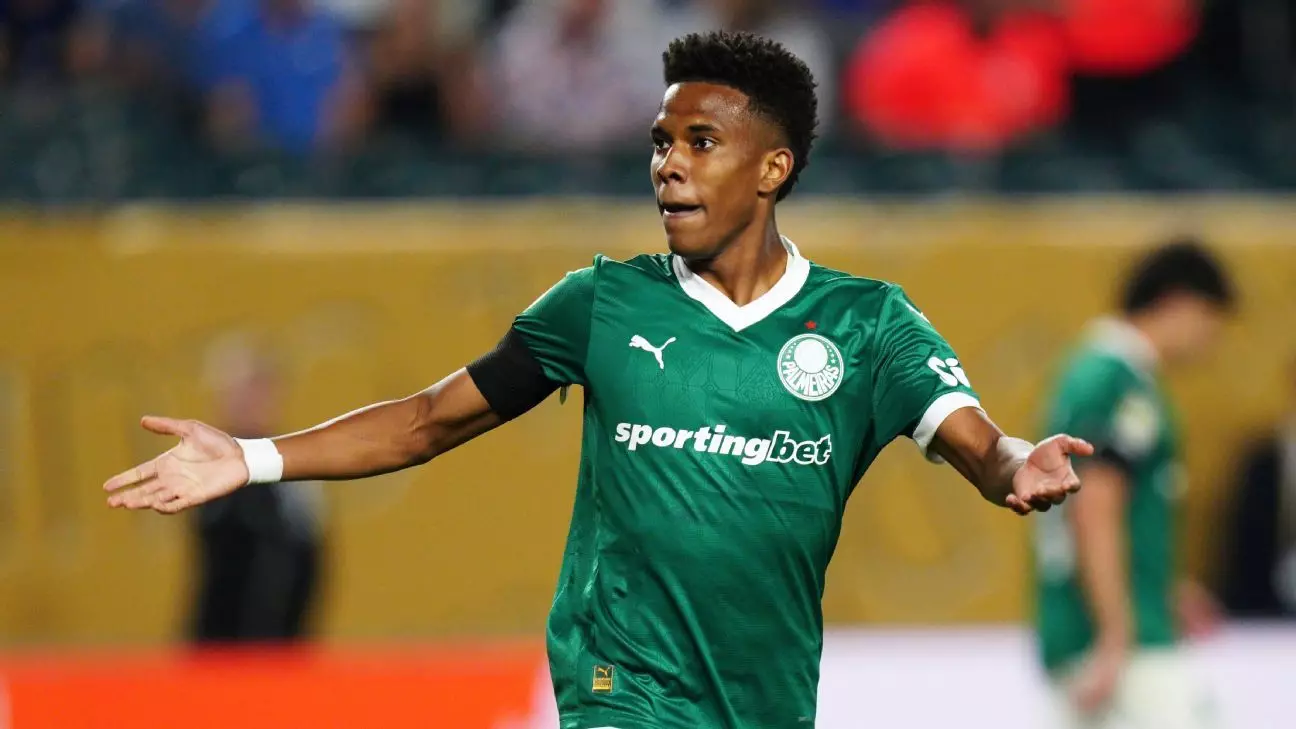In the high-stakes arena of international football, where talent alone does not guarantee success, emerging young players are often the most intriguing prospects. Estêvão Willian’s recent performance against Palmeiras provides a compelling glimpse into his potential, illustrating how raw talent, combined with strategic nurturing, can forge a future superstar. While the young forward’s goal did not alter the ultimate outcome—a win for Chelsea in the FIFA Club World Cup—his display on the pitch underscored why he is a player worth investing in. This moment was more than just a notable goal; it was a declaration that Estêvão possesses the attributes necessary to thrive in the demanding environment of European football.
At 18, Estêvão already exhibits a maturity and skill level that surpasses many of his peers. His speed, agility, and composure in tight spaces demonstrate a player with a high ceiling. Yet, it is precisely his youth and inexperience that prompt caution from seasoned observers such as Palmeiras coach Abel Ferreira. Ferreira’s advice for Chelsea to “embrace” and “take care of him” is not mere platitude but a significant reminder that young talent requires a delicate balance of challenge and support. This player’s journey from the relative comfort of Brazilian football to the rigorous, competitive climate of the Premier League will test his resilience, adaptability, and emotional strength.
It’s crucial for Chelsea to recognize that the transition for players like Estêvão isn’t simply about skill. It involves navigating cultural shifts, facing relentless competition, and managing the high expectations that come with a multi-million-dollar investment. Ferreira’s humorous comment about the sun in England highlights how even seemingly minor differences—like climate—can impact a young player’s confidence or comfort. Chelsea’s responsibility transcends coaching; it extends into providing an environment where Estêvão can learn from mistakes, grow stronger, and develop a tactical awareness suited to the European game.
Strategic Nurture Versus Unfettered Expectations
The transfer deal, valued at approximately £33.8 million, underscores Chelsea’s belief in Estêvão’s potential as more than just a fleeting talent. However, heavy investment demands careful management to prevent the pitfalls of overexposure or undue pressure that can hamper development. Ferreira’s words serve as a warning—and an encouragement—emphasizing that this player’s journey is just beginning. They remind us that football is as much about nurturing character as it is about showcasing skills on the field.
Chelsea’s role now is to craft a comprehensive support system for Estêvão—coaching staff dedicated to strategic growth, mentors experienced in guiding young talent through adaptation, and a team culture that prioritizes patience. The club must resist the temptation to rush him into a starring role before he’s ready. Instead, they should focus on incremental development, allowing him to amass experience, confidence, and tactical understanding. After all, many young players flourish when given the time and space to evolve at their own pace.
Moreover, Estêvão’s arrival signifies a potentially transformative period for Chelsea’s youth development philosophy. Investing in such a promising talent isn’t simply about immediate results but about planting seeds for a sustainable future built on nurturing homegrown stars. This approach aligns with modern football’s shift toward developing young players internally, combining technical expertise with psychological support.
The Heavyweight of Expectations and the Lightness of Youth
The comments from Ferreira about Estêvão’s physicality and strength, despite his slim appearance, reveal a vital aspect of player development—underscoring that appearances can be deceiving. It suggests that young athletes often possess hidden resilience and core strength that may not be immediately evident. This trait, combined with his speed and dribbling ability, hints at a player capable of dictating matches with a combination of technical skill and mental toughness.
However, the looming pressure of high transfer fees and the ever-present spotlight in European football threaten to overshadow his potential. This is where the importance of vision and patience becomes paramount. Chelsea’s management has a defining opportunity to build a nurturing environment that champions long-term growth over quick fixes. They should emulate Ferreira’s approach—balancing praise with realistic expectations, and fostering an environment where mistakes are viewed as vital steps in the learning process.
Estêvão’s story is just beginning, and while the road ahead will be fraught with challenges, his natural talent and the right support can propel him to levels that transcend his age. Chelsea’s strategic patience, coupled with Ferreira’s wisdom, may just turn this promising star into a shining example of how proper nurturing enables raw talent to reach its pinnacle. If managed correctly, Estêvão will not only meet expectations but redefine what it means to be a young talent in the modern game.

